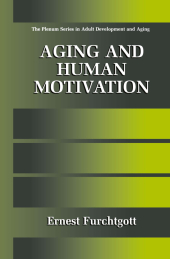 Neuerscheinungen 2011Stand: 2020-01-07 |
Schnellsuche
ISBN/Stichwort/Autor
|
Herderstraße 10
10625 Berlin
Tel.: 030 315 714 16
Fax 030 315 714 14
info@buchspektrum.de |

Ernest Furchtgott
Aging and Human Motivation
1999. 2011. xii, 396 S. XII, 396 p. 235 mm
Verlag/Jahr: SPRINGER, BERLIN 2011
ISBN: 1-441-93311-5 (1441933115)
Neue ISBN: 978-1-441-93311-9 (9781441933119)
Preis und Lieferzeit: Bitte klicken
I first met Ernest Furchtgott twenty-five years ago after joining the faculty of the College of Social Work at the University of South Carolina. At that time, Ernie chaired the Department of Psychology. In the following three years we collaborated with an Academic Committee on Gerontology in conceptualizing and shaping the University´s Certificate of Graduate Study in Gerontology Program, guiding it to final approval by the South Carolina Commission on Higher Education. For twenty years we team taught our graduate-level course, "Psychosocial Approaches to Geron tology," involving colleagues from related disciplines. Over the years, we examined and jointly graded hundreds of research posters prepared by our graduate students in gerontology as their final course requirement. Several years ago, Ernie formally retired from the university. He in stantly agreed to my request that he continue teaching the psychology of aging portion of our interdisciplinary course. On campus nearly every day since retirement, Ernie frequently telephoned to discuss are cent article in The Gerontologist or a paper presentation that had ex cited him at the Gerontological Society´s annual scientific meeting. He maintained a clear presence in the academic community.
1: Introduction. Why This Monograph? Motivation. Definitions of Aging Our Focus. Reprise. 2: Biological Foundations. Introduction. Cerebral Metabolism. Neurotransmitters. The Endocrines. The Immune System. Cardiovascular Functions. Conclusions. 3: Sleep and Fatigue. Sleep. Summary. Fatigue. Summary. 4: Pain and Discomfort Avoidance. Introduction. Motivational-Emotional Aspects. Perception and Measurement of Pain. Interpretation of Symptoms. Culture. Personality. Conclusions. 5: Eating and Drinking. Introduction. Eating. Drinking-Fluid Intake. Conclusions. 6: Sexuality. Introduction. Biology. Culture. Surveys. Physical Health and Psychological Wellness. Conclusions. 7: Health Behaviors. Introduction. Definitions. The Role of Motivation. Theoretical Underpinnings. Perception of Health Status. Health Care Services Utilization. Health Promotion and Preventive Health Behaviors. Conclusions. 8: Stress. Introduction. Definitions. Theories. Aging and Stress. Classifications and Measurement. Biological Effects. Psychological Effects. Conclusions. 9: Coping. Introduction. Coping Styles and Strategies. The Age Factor. Wisdom and Religion. Conclusions. 10. Ecological Studies of Stress and Coping. Introduction. Measurement. Caregiving. Summary. Bereavement. Summary. 11: The Self. Introduction. The Self and Social Motivation. Some Definitional Problems. Aging. The Temporal Factor: Past, Present, and Future Selves. Conclusions. 12: Purpose or Meaning of Life. The Construct. Modern Expositors. Relationship to Other Constructs. Empirical Studies. Conclusions. 13: Social Relationships. Introduction. Theoretical Perspectives. Theories. Isolation and Loneliness. Factors Affecting Close Contacts. Conclusions. 14: Achievement Motivation. The Construct. Some Data on Older Populations. Conclusions. 15: Leisure. Introduction. Theories. The Role of Motivation and Its Assessment. The Life Course. Some Determinants of Leisure. Adult Education. Amenity Migration. Volunteering. Conclusions. 16: Epilogue. References. Index.


